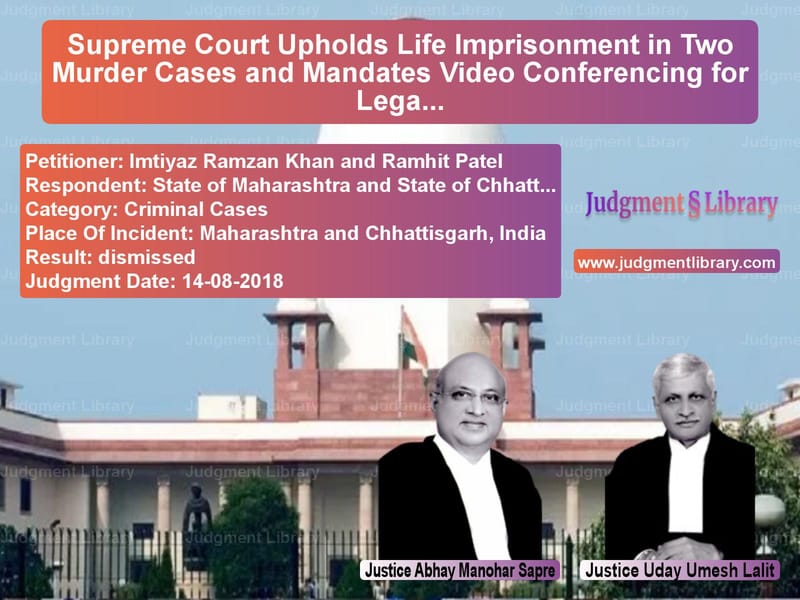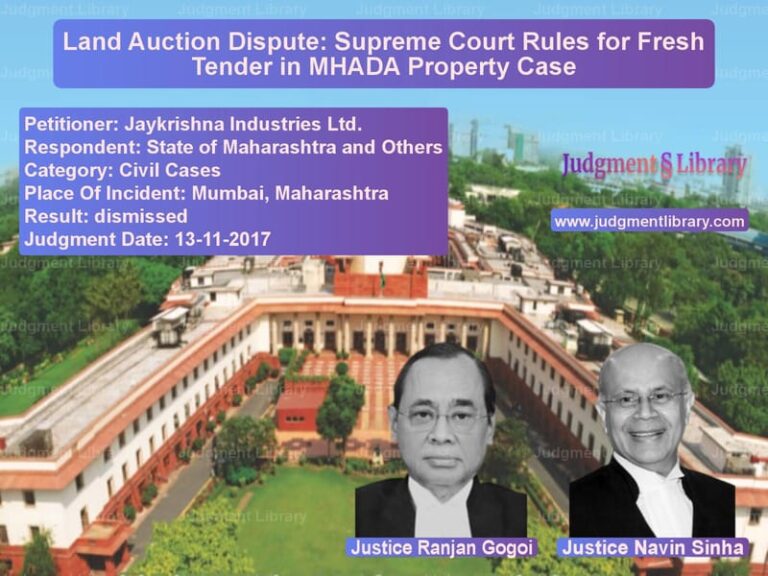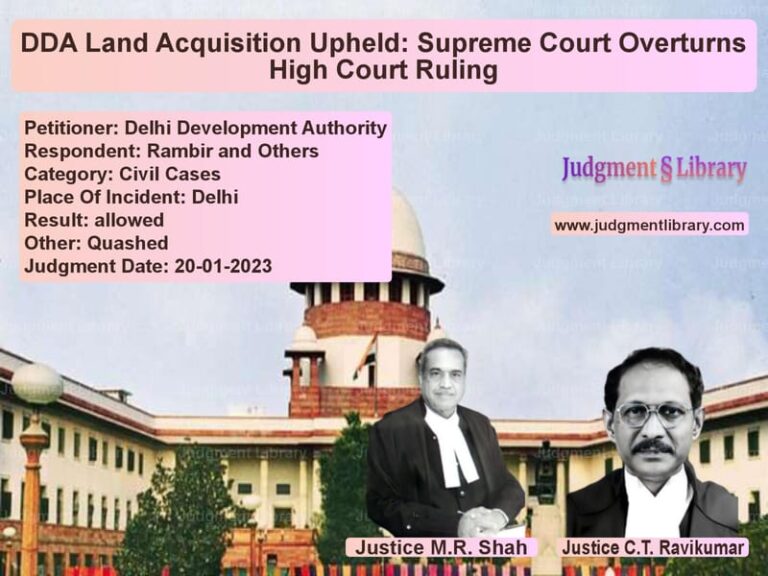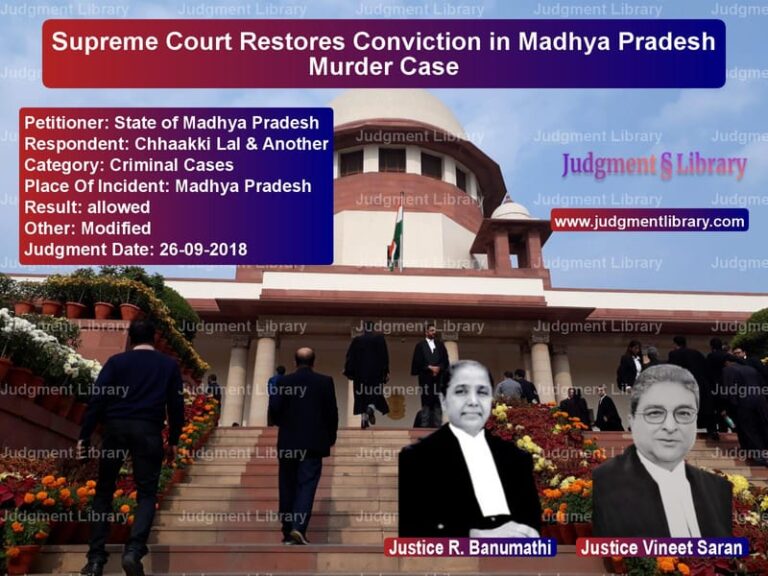Supreme Court Upholds Life Imprisonment in Two Murder Cases and Mandates Video Conferencing for Legal Aid
The Supreme Court of India, in its judgment dated August 14, 2018, ruled on two separate special leave petitions concerning murder convictions. The case, Imtiyaz Ramzan Khan vs. State of Maharashtra and Ramhit Patel vs. State of Chhattisgarh, involved appeals against life imprisonment sentences under Section 302 of the Indian Penal Code (IPC). The Supreme Court dismissed both petitions, affirming the High Court’s decisions that upheld the convictions. Additionally, the Court issued a significant directive mandating video conferencing facilities between legal aid lawyers and accused persons in jails.
This ruling not only reinforces the principle that murder convictions must be based on strong and reliable evidence but also introduces an important reform in legal aid representation for undertrial and convicted prisoners.
Background of the Case
These two special leave petitions, though unrelated in their subject matter, were heard together because they raised a common procedural issue regarding legal representation for incarcerated accused persons. The first case involved Imtiyaz Ramzan Khan, who was convicted of murder by the Bombay High Court. The second case involved Ramhit Patel, who was convicted by the Chhattisgarh High Court.
In both cases, the prosecution relied on direct eyewitness accounts, which were found credible by the respective High Courts. The defense in each case argued that the evidence was unreliable and that the accused were not given a fair trial.
Petitioner’s Arguments
The petitioners’ counsel contended that:
- The convictions were based on unreliable witness testimonies.
- Both High Courts failed to consider the defense’s arguments adequately.
- In the case of Ramhit Patel, there was a claim of a ‘sudden fight’ that should have been considered a mitigating factor under Exception 4 to Section 300 IPC.
- The defense lawyers representing the accused were unable to communicate effectively with their clients in prison, impacting their ability to present a strong defense.
Respondent’s Arguments
The State of Maharashtra and the State of Chhattisgarh argued that:
- In both cases, the prosecution’s eyewitness testimonies were strong and corroborated by circumstantial evidence.
- There were no procedural lapses in the trial or appellate process.
- The argument of a ‘sudden fight’ was rightly rejected by the High Court in Ramhit Patel’s case, as there was sufficient evidence to prove premeditation.
- The legal representation issue, while relevant, did not affect the fairness of the trial.
Supreme Court’s Observations
The Supreme Court, after reviewing the evidence and legal arguments, upheld the convictions, stating:
“The prosecution principally relied on the testimony of two eyewitnesses, namely PWs 3 and 5, whose evidence was found by the High Court to be worthy of reliance and completely unblemished.”
The Court dismissed the argument of a sudden fight in Ramhit Patel’s case, holding:
“The High Court on detailed analysis rejected said theory and found the petitioner guilty of the offense in question. Having gone through the matter, we see no reason to take a different view.”
Directive on Legal Aid and Video Conferencing
While dismissing the appeals, the Court made a crucial observation regarding the challenges faced by legal aid lawyers in representing accused persons in jail. The Court noted:
“Very often, we see that the learned Advocates who appear in matters entrusted by the Supreme Court Legal Services Committee do not have the advantage of having had a dialogue with either the accused or those who are in the know of the details about the case. This at times seriously hampers the efforts on part of the learned Advocates.”
To address this issue, the Supreme Court issued a directive:
- All Legal Services Authorities/Committees in every state shall ensure the provision of video conferencing facilities between accused persons in jail and their appointed legal aid lawyers.
- The facility must be provided in every criminal case where the accused is lodged in jail.
- The objective is to facilitate dialogue between the counsel and the accused to further the cause of justice.
Final Verdict
The Supreme Court ruled:
- Both special leave petitions were dismissed, and the life imprisonment sentences of the accused were upheld.
- The directive for implementing video conferencing between legal aid lawyers and accused persons in jail was issued to all state legal services authorities.
Conclusion
The ruling in Imtiyaz Ramzan Khan vs. State of Maharashtra and Ramhit Patel vs. State of Chhattisgarh serves as an important precedent in two aspects: upholding the legal standard for murder convictions and introducing procedural improvements for legal aid representation. By making video conferencing between lawyers and incarcerated clients mandatory, the Supreme Court has taken a significant step toward improving access to justice for underprivileged accused persons.
Petitioner Name: Imtiyaz Ramzan Khan and Ramhit Patel.Respondent Name: State of Maharashtra and State of Chhattisgarh.Judgment By: Justice Abhay Manohar Sapre, Justice Uday Umesh Lalit.Place Of Incident: Maharashtra and Chhattisgarh, India.Judgment Date: 14-08-2018.
Don’t miss out on the full details! Download the complete judgment in PDF format below and gain valuable insights instantly!
Download Judgment: Imtiyaz Ramzan Khan vs State of Maharashtra Supreme Court of India Judgment Dated 14-08-2018.pdf
Direct Downlaod Judgment: Direct downlaod this Judgment
See all petitions in Murder Cases
See all petitions in Bail and Anticipatory Bail
See all petitions in Custodial Deaths and Police Misconduct
See all petitions in Judgment by Abhay Manohar Sapre
See all petitions in Judgment by Uday Umesh Lalit
See all petitions in dismissed
See all petitions in supreme court of India judgments August 2018
See all petitions in 2018 judgments
See all posts in Criminal Cases Category
See all allowed petitions in Criminal Cases Category
See all Dismissed petitions in Criminal Cases Category
See all partially allowed petitions in Criminal Cases Category







